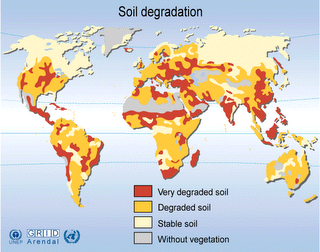 Soil erosion, salinity: Devastating problems The illustration shows dramatically the enormous global extant of soil erosion, a problem which has been noted from ancient times: "Attica yielded far more abundant produce. In comparison of what then was, there are remaining only the bones of the wasted body; all the richer and softer parts of the soil having fallen away, and the mere skeleton of the land being left. But in the primitive state of the country, the mountains were high hills covered with soil, and plains were full of rich earth, and there was abundance of wood in the mountains. Of this last traces still remain, for although some of the mountains now only afford sustenance to bees, not so very long ago there were still to be seen roofs of timber cut from trees growing there, which were of such a size sufficient to cover the largest houses; and there were many other high trees, cultivated by man and bearing abundance of food for cattle.
Soil erosion, salinity: Devastating problems The illustration shows dramatically the enormous global extant of soil erosion, a problem which has been noted from ancient times: "Attica yielded far more abundant produce. In comparison of what then was, there are remaining only the bones of the wasted body; all the richer and softer parts of the soil having fallen away, and the mere skeleton of the land being left. But in the primitive state of the country, the mountains were high hills covered with soil, and plains were full of rich earth, and there was abundance of wood in the mountains. Of this last traces still remain, for although some of the mountains now only afford sustenance to bees, not so very long ago there were still to be seen roofs of timber cut from trees growing there, which were of such a size sufficient to cover the largest houses; and there were many other high trees, cultivated by man and bearing abundance of food for cattle. "Moreover, the land reaped the benefit of the annual rainfall, not as now losing the water which flows off the bare earth into the sea, but, having an abundant supply in all places, and receiving it into herself and treasuring it up in the close clay soil, it let off into the hollows the streams which it absorbed from the heights, providing everywhere abundant fountains and rivers, of which there may still be observed sacred memorials in places where fountains once existed; and this proves the truth of what I am saying. (Plato)"
The EB article says "Erosion in some regions it is so great that a tonne of produce comes at a cost of 20 tonnes of topsoil." This can rightly be compared to wood 'production' on Easter Island. The workforce is larger, tonnage and income and profits are up, according to the conventional measures. There is an obvious and urgent need to reformulate the national accounts to incorporate the value of the environment, so that destructive if not suicidal activities such as these are shown immediately as loss of value and national impoverishment.


No comments:
Post a Comment